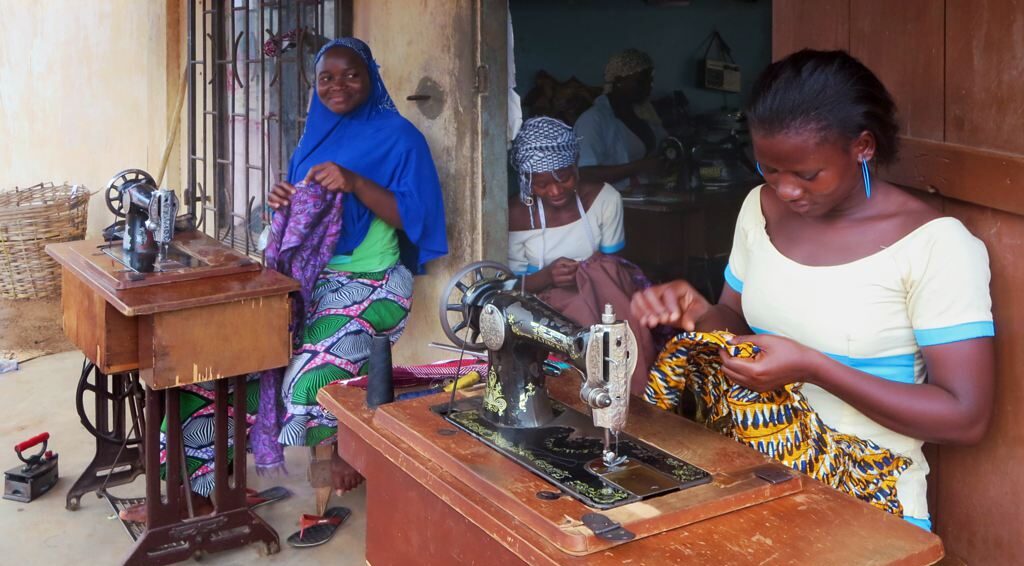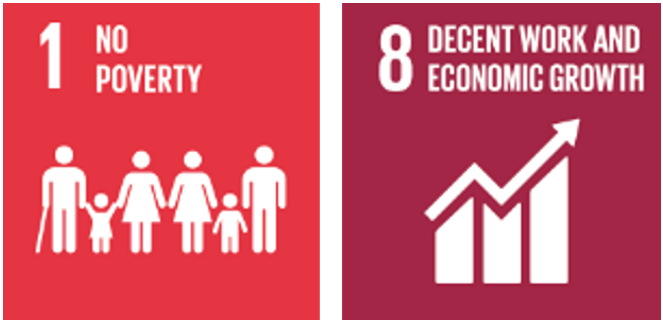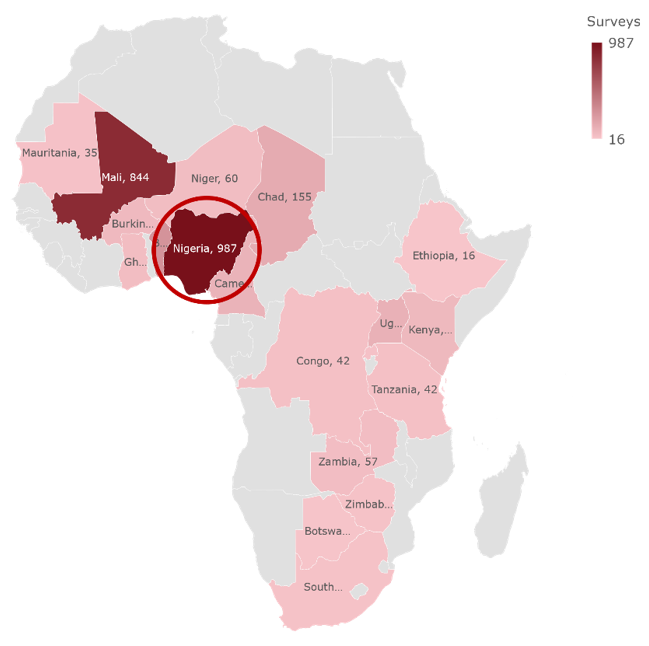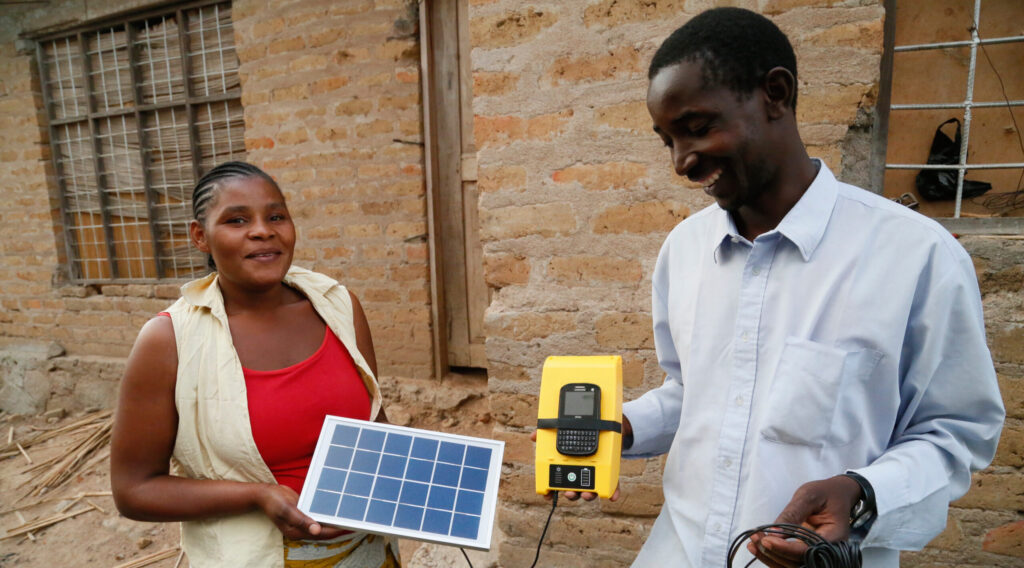By: Lauren Elreda, Research Manager

Seamstresses sewing dresses
In 2015, the United Nations established the 17 Sustainable Development Goals (SDGs) as a call to action for developed and developing nations around the world to work together to reduce poverty and inequality, improve health and education, tackle climate change, and spur economic growth. Organizations like the Aspen Network of Development Entrepreneurs (ANDE) emphasize that small and growing businesses (SGBs) in developing nations are instrumental to achieving these goals by creating jobs, stimulating long-term economic growth, and ultimately helping to lift their countries out of poverty. The need for progress toward these goals is particularly urgent in countries like Nigeria, where the current economic environment is unstable and declining, inequality is high, job opportunities are lacking, and population growth is outpacing poverty reduction, leaving millions (and a growing number) of Nigerians in poverty (The World Bank in Nigeria, 2023). This article features a case study of how a philanthropy-backed program, focused on fostering entrepreneurship across Africa, has supported progress towards the SDGs in Nigeria.
Resources:
For a two-page synopsis of the full case study, see here.
To read the full report, see here.
A Case Study: The TEF Entrepreneurship Program
A philanthropic organization established in 2010, the Tony Elumelu Foundation (TEF) put forth a mission to empower a new generation of African entrepreneurs, drive poverty eradication, catalyze job creation across Africa, and increase women’s economic empowerment. The Foundation describes its mission as rooted in the philosophy that the private sector, and particularly entrepreneurs, can be a catalyst for the social and economic development of the African continent.
To that end, The Tony Elumelu Foundation made a $100 million commitment in 2015 to empower 10,000 African entrepreneurs across all 54 African countries over a period of 10 years through its flagship Entrepreneurship Programme. Launched the same year as the UN established its SDGs, the Programme seeks to train, mentor, and fund aspiring African entrepreneurs, with the goal of creating one million jobs and generating $10 billion in revenue for Africa. To achieve this objective, TEF and its partners adopted a comprehensive approach towards building entrepreneurial capacity, which includes the following:
- Building skills through formal training
- Awarding seed capital
- Providing mentorship and networking opportunities
In the fall of 2022, TEF commissioned ORB International to conduct a large-scale evaluation of the TEF Entrepreneurship Programme’s impact. As part of this evaluation, ORB assessed the impact of the Programme based on indicators of progress toward eight of the 17 SDGs. For demonstration purposes, this article focuses on two of the SDGs with the greatest relevance to the overarching goals of the TEF Entrepreneurship Programme: 1) reduction of poverty and 2) promotion of economic growth, full and productive employment, and decent work for all.

Methodology
ORB collected quantitative survey data from 3,160 Programme beneficiaries (29% of beneficiaries) across 53 African countries who completed the TEF Entrepreneurship Programme between 2015-2020. For comparison, we also collected data from 1,312 non-beneficiaries who had applied to the Programme between 2015-2020 but were not selected. Respondents completed the surveys primarily online (i.e., web surveys); ORB supplemented this with phone calls and site visits to maximize survey completion rates. Additionally, ORB conducted 20 qualitative interviews with a subset of program staff and beneficiaries to contextualize the survey data.
Achieved Beneficiary Sample in TEF Impact Assessment

ORB designed evaluation instruments to assess the TEF Entrepreneurship Programme’s relevance, effectiveness, and impact on a range of targeted outcomes linked to many of the SDGs.
The Results: TEF-Supported Businesses Earn More Profits and Create More Jobs
Results of ORB’s impact evaluation point to positive impact of the TEF Entrepreneurship Programme on progress toward SDG 1 and 8 in Nigeria.
Earning More Profit: As one (of several) indicators of the financial success of their businesses, business-owning beneficiaries and non-beneficiaries reported how many of the past six months their business had earned profit, broken even, or their spending had exceeded revenue. Given the need to keep non-beneficiary surveys brief in order to encourage completion, this was the best indicator of profits that we had available from both beneficiaries and non-beneficiaries.
After statistically controlling for number of years in business, we found that Nigerian business owners who were beneficiaries of the TEF Entrepreneurship Programme earned profit significantly more often in the past six months than non-beneficiaries did. The higher frequency of earning profits, meaning that the businesses’ incoming revenues were greater than their spending over a given period, is one clear, important sign of the TEF Entrepreneurship Programme’s impact: specifically, that the TEF Entrepreneurship Programme supports new entrepreneurs to develop financially successful, sustainable businesses. By supporting new entrepreneurs to earn revenue and develop sustainable businesses, the TEF Entrepreneurship Programme is contributing to progress toward both of the highlighted SDGs: facilitating economic growth (e.g., increasing production of goods and services), and helping to keep beneficiaries, their families, and their employees out of poverty.

In-home solar panel distributors
Creating More Jobs: Business-owning beneficiaries and non-beneficiaries also reported how many people they currently employ for their business. After controlling again for the number of years in business, the businesses of beneficiaries employ significantly more people than do those of non-beneficiaries. In fact, despite being in operation for an average of seven fewer months than the non-beneficiaries who responded to our survey, Nigerian beneficiaries reported employing on average nearly twice as many people (10.4 employees) as did non-beneficiaries (5.9 employees). The larger number of employees of beneficiaries relative to their counterparts also suggests that the TEF Entrepreneurship Programme has been successful at accelerating business growth among their beneficiaries, as expanding numbers of employees is one important indicator of business growth that beneficiaries were able to achieve, faster and on a larger scale than non-beneficiaries.
This finding also serves as compelling evidence that the TEF Entrepreneurship Programme has significantly and meaningfully contributed to the creation of jobs across Nigeria. Again, the creation of jobs is an important indicator of progress toward both SDGs, by helping to promote full, productive employment, and in turn, helping to keep more Nigerians out of poverty.
Conclusions
Taken together, these two example findings point to successes of the TEF Entrepreneurship Programme in promoting the development and acceleration of successful, sustainable, growing businesses with the potential to help stimulate Nigeria’s long-term economic growth, increase employment rates, and keep both business owners and their employees out of poverty. More broadly, these findings also highlight the important role of small and growing businesses in developing nations, and the value of philanthropic organizations that help facilitate the success of those businesses, in contributing to progress toward the UN’s global SDGs. This evaluation of the TEF Entrepreneurship Programme highlights a successful example of the valuable impact that targeted training, mentorship, networking, and seed funding can have in developing nations on both new entrepreneurs and on the broader communities and economies in which they are embedded.
___________________________________
“Seamstresses sewing dresses”: Photo by David Stanley, CC BY 2.0 DEED, cropped
“In-home solar panel distributors”: Photo by Russell Watkins/Department for International Development, CC BY 2.0 DEED, changes made: blurred logos on solar panel hub and phone, cropped
